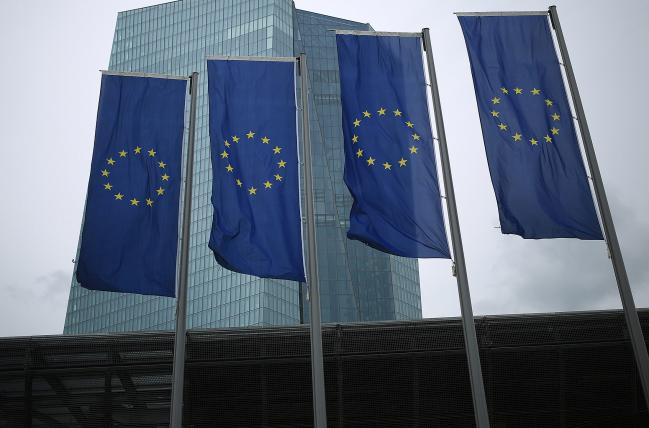(Bloomberg) -- European Central Bank policy makers said they’re open to tweaking their policy guidance soon to align it with a strengthening economy, spurring a rise in the euro as traders bet bond-buying will end in September.
In the account of its December meeting, the Governing Council said there was a “widely shared” view among officials that communication would need to evolve gradually based on the outlook for growth and inflation. But the language on the monetary-policy stance could be revisited early this year.
The euro jumped a cent, and was trading at $1.2039 at 3:20 p.m. in Frankfurt. The yields on German bonds also increased, with the two-year yield gaining 4 basis points to minus 0.57 percent.
“The big picture is that any shift in communication, whether it happens in March or June or if it’s gradual or hawkish, now seems to be backed by the majority of the Governing Council, which didn’t seem to be the case in October,” said Frederik Ducrozet, an economist at Banque Pictet & Cie in Geneva, adding that QE may end even if underlying price pressures only improve slightly. “This could have some very concrete policy implications.”
Investors are currently on edge after reminders that central banks around the world have the potential to roil financial markets in 2018. A minor tweak in the Bank of Japan’s bond-purchase operation on Tuesday saw the yen strengthen more than 1 percent in two days, and a change in the way China’s central bank manages the yuan sparked losses in that currency.
Traders Remind Central Banks to Take Care on Route to Exit Door
Though inflation remains weaker than the ECB would like, the broader economy is booming, with the central bank estimating the fastest expansion in 10 years in 2017. Surveys of confidence have surged and measures of activity are at multi-year highs. The Governing Council said recent numbers show a “solid, broad-based and increasingly self-sustaining economic expansion.”
Noted in the account was a remark that a “gap appeared to be emerging between favorable economic conditions and a policy stance that remained in a crisis configuration.” It was also pointed out that those conditions depended in part on loose monetary policy and inflation would be key to any shift.
| “Looking ahead, the view was widely shared among members that the Governing Council’s communication would need to evolve gradually, without a change in sequencing, if the economy continued to expand and inflation converged further towards the Governing Council’s aim. The language pertaining to various dimensions of the monetary policy stance and forward guidance could be revisited early in the coming year.”
|
EURO-AREA INSIGHT: QE May Continue Until Phillips Curve Fixed
At its December meeting, the ECB confirmed its decision to extend quantitative easing until at least September, at a reduced monthly pace of 30 billion euros ($36 billion), despite the faster economic expansion. Record-low interest rates will stay on hold until well after purchases stop.
Since that decision, hawks calling for a definite end-date to asset purchases have dominated the public debate, raising speculation among investors that the bank is readying another scaling back of its monetary stimulus.
Estimates on Thursday showed the Germany economy probably grew about 0.5 percent in the fourth quarter of 2017, while France’s expanded 0.6 percent. A separate report from France showed business sentiment at the highest in almost seven years.
According to the ECB report, policy makers agreed that while economic data had been more positive than expected, underlying inflation “had yet to show convincing signs of a sustained upward trend.” The central bank’s latest projections show that consumer-price growth will only average 1.7 percent by 2020, still short of its goal of just under 2 percent.
Executive Board member Peter Praet, the ECB’s chief economist, suggested that, as the end of QE approached, guidance on future interest-rate moves would become gradually more important.
At the previous session in October, some key policy makers including Executive Board member Benoit Coeure and Bundesbank president Jens Weidmann had suggested linking the overall policy stance -- rather than just the QE program -- to progress on inflation. A reflection on such a move was “warranted,” according to the summary.
